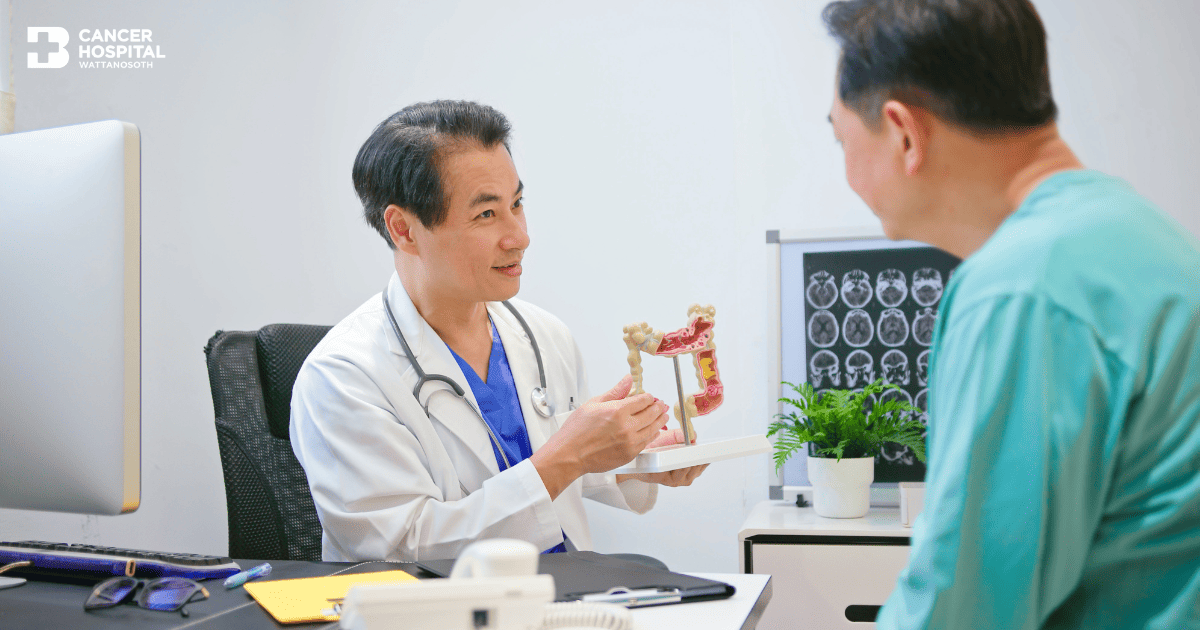
Colorectal Cancer Screening: Why It Matters and When to Get Tested
Colorectal cancer is one of the most common types of cancer, yet it is highly treatable when detected early. At Bangkok Hospital and Wattanosoth Cancer Hospital, we prioritize the health and well-being of our patients by offering advanced cancer screening and treatment options. Early detection through regular screenings can save lives and improve outcomes for cancer patients. Here’s what you need to know about colorectal cancer screening and how it can make a difference.
Why Colorectal Cancer Screening Matters
Colorectal cancer is the third most common cancer in both men and women. The risk increases significantly in individuals over the age of 50. Most cases begin as small, non-cancerous growths called adenomatous polyps, which can develop into cancer over time. In Thailand, colorectal cancer is becoming increasingly prevalent in both men and women.
Early screening is essential as colorectal cancer often develops without noticeable symptoms in its initial stages. Regular screenings can:
- Identify cancer at an early stage: Detecting and removing polyps during a colonoscopy can prevent them from progressing into advanced cancer.
- Improve survival rates: Early-stage colorectal cancer has a five-year survival rate of over 90%.
- Reduce treatment complexity: Detecting cancer early often means less invasive and faster cancer treatment options.
When to Get Tested
Certain factors increase the likelihood of developing colorectal cancer. High-risk groups include:
- Family history: Individuals with a family history of colorectal cancer or polyps, particularly if affecting immediate relatives, are at a two-thirds higher risk.
- Inflammatory bowel disease: Conditions such as Crohn’s disease or ulcerative colitis increase risk.
- Lifestyle habits: Diets high in fatty and red meats, lack of fruits and vegetables, obesity, smoking, and alcohol consumption are significant contributors.
- Age: Risk increases for individuals over 50.
It is important to note that 80% of patients diagnosed with colorectal cancer did not have obvious risk factors, making regular screenings vital for everyone.
Symptoms to Watch For
Colorectal cancer symptoms may include:
- Blood in feces or rectal bleeding
- Persistent changes in bowel habits, such as constipation or diarrhea
- Unexplained weight loss
- Persistent abdominal discomfort
- Fatigue or weakness
These symptoms might not appear in early stages, emphasizing the importance of proactive screening.

Screening Methods
Diagnosis involves several methods to determine the stage and spread of cancer, including:
- Lower endoscopy: Essential for direct visualization of the colon and rectum, this method allows for immediate detection and removal of polyps, reducing the risk of cancer development.
- CT scans and MRIs: Crucial for detecting cancer’s spread to surrounding tissues and organs, these methods help guide treatment decisions effectively.
- Blood tests for carcinoembryonic antigen (CEA): Useful for monitoring cancer progression or recurrence, especially in individuals already diagnosed with colorectal cancer.
- Double contrast barium enema: A valuable alternative for visualizing the colon and rectum, particularly when other screening methods are not suitable.
Our specialists at Wattanosoth Cancer Hospital are equipped with cutting-edge technology to ensure accurate and comfortable screenings.
Prevention Through Lifestyle Changes
Adopting healthy lifestyle habits can reduce the risk of colorectal cancer. These include:
- Maintaining a balanced diet rich in fruits, vegetables, and whole grains.
- Limiting red and processed meats.
- Engaging in regular physical activity.
- Avoiding smoking and excessive alcohol consumption.
Comprehensive Cancer Care at Wattanosoth Cancer Hospital
If colorectal cancer is detected, timely treatment is critical. Wattanosoth Cancer Hospital is a leader in cancer treatment, offering personalized care plans that may include:
- Minimally invasive surgeries
- Targeted therapy and immunotherapy
- Advanced chemotherapy techniques
- Supportive care for cancer patients, including psychological counseling and nutrition guidance
Our multidisciplinary team is committed to providing fast cancer treatment to minimize disruption to your life while ensuring the highest quality of care.
Take Action Today
Proactively managing your health is the best gift you can give yourself and your loved ones. Schedule your colorectal cancer screening at Wattanosoth Cancer Hospital today. With early detection and expert care, you can reduce your risk and live a healthier, longer life.
For more information about cancer treatment and screenings, contact us or visit our website. Let’s work together to fight colorectal cancer effectively and ensure better outcomes for everyone.